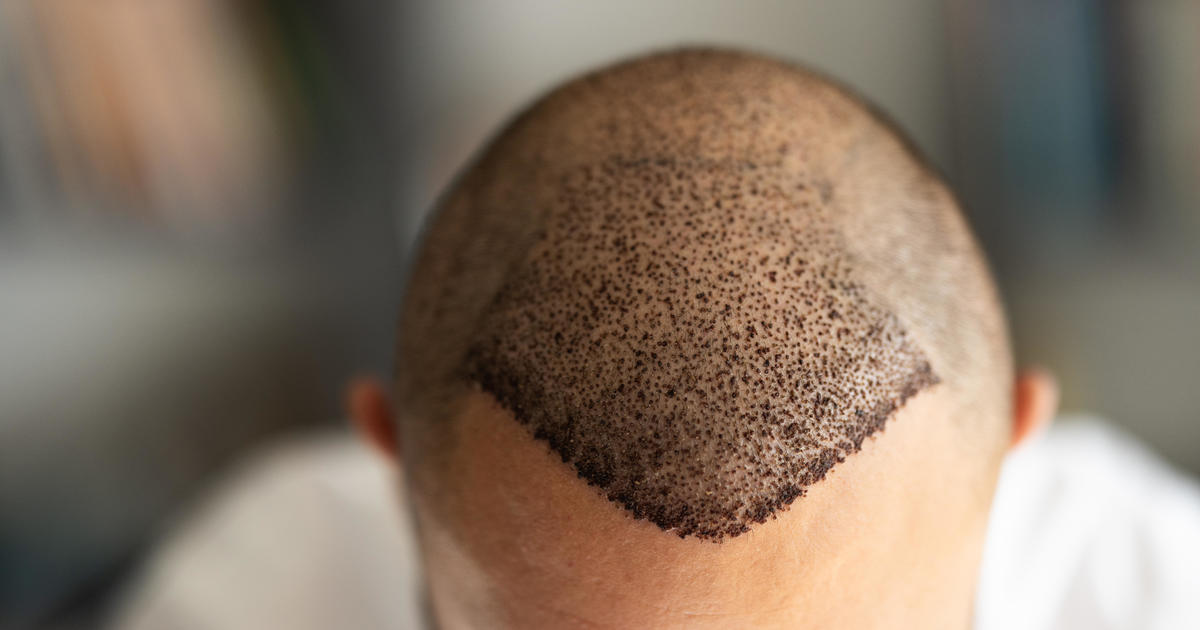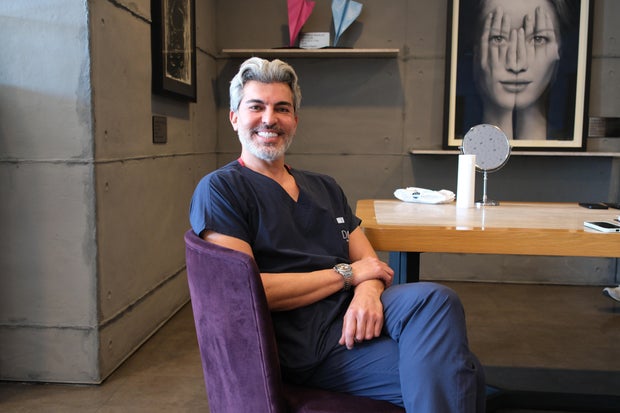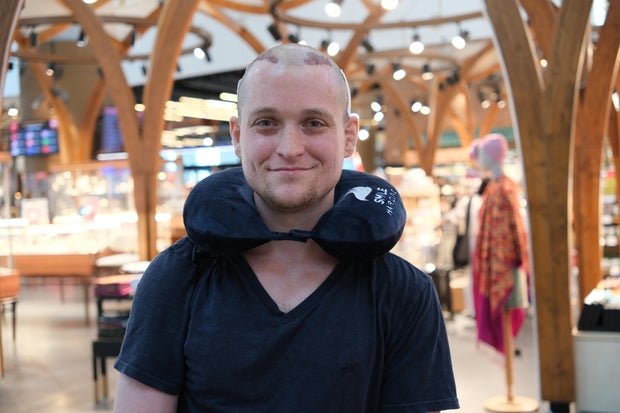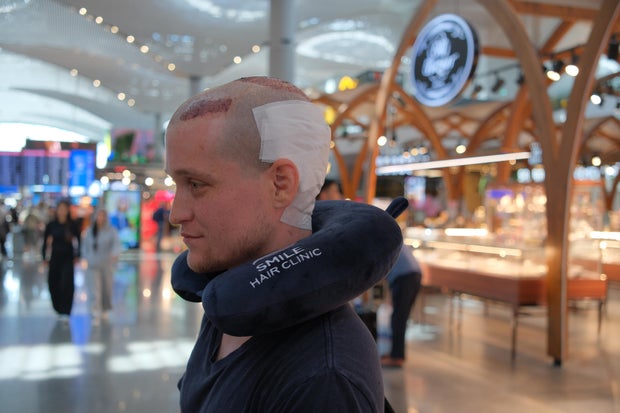Gaze around Istanbul Airport and you are almost certain to spot a male traveler with a shaved head and a bandaged, bloody scalp. Some travel in groups or pairs, while others are alone. But they’ve all trekked to Turkey in pursuit of one thing: hair.
Many Americans and medical tourists from other countries are today flocking to Istanbul, which has gained a reputation as a premier destination for hair transplantation and restoration. Generally, the process involves implanting healthy hair follicles into a patient’s scalp in bald areas and along a desired hairline, resulting in natural-looking results over time.
Turkey offers procedures that are also widely available in the U.S., but for a fraction of the price, according to patients who elected to undergo the surgery abroad. Many patients also attest to the high quality of care available in Turkey, including the deep bench of doctors experienced in this type of cosmetic operation.
The doctors, not surprisingly, agree.
“In this world, when someone does something better, people go there,” Dr. Serkan Aygin, an Istanbul-based hair transplant doctor, told CBS MoneyWatch. “We have a number of very good, very serious clinics in Turkey with deep backgrounds in hair transplantation.”
Megan Cerullo / CBS News
“Here for the price”
Aaron Collins, 30, traveled from Chicago to Turkey in August for an appointment at Smile Hair Clinic, an Istanbul-based clinic led by two hair transplant surgeons — both members of the International Society of Hair Restoration Surgery (ISHRS) — which is certified to treat international patients.
Turkey isn’t the only country to welcome medical tourists on a budget seeking a variety of cosmetic procedures. And sometimes the results can be disastrous. More than 90 U.S. citizens died after traveling to the Dominican Republic for cosmetic surgery between 2009 and 2022, according to the Centers for Disease Control and Prevention.
Megan Cerullo / CBS News
Collins chose Smile after researching hair restoration surgery online. His procedure, which cost $6,000, involved implanting 4,100 follicular unit grafts pulled from the back of his head to his scalp. Although he found lower-priced treatment, Collins said he wanted the entire procedure to be performed by, or under the supervision of, a licensed doctor.
“I really came here for the price. In Turkey, it’s probably one-third of what it costs in the U.S. — it can maybe get down to one-fifth. And I have heard that depending on where you go, the quality of the procedure itself is pretty equivalent,” he told CBS MoneyWatch.
Megan Cerullo / CBS News
Collins said technicians working under a surgeon’s supervision extracted follicles from the back of his head, called the donor area, and inserted them along his desired hairline. The surgeon performed all the incision work and determined the hairline — something he paid extra for but that he believes was worth the added cost.
“It’s crazy enough to travel to another country,” he said.
Medical tourism boom
Collins is one of many Americans who have traveled thousands of miles for a cosmetic procedure for a fraction of what a top-notch version of the same procedure would cost in the U.S. In 2023, more than 1.5 million tourists visited Turkey for medical procedures, spending roughly $3 billion, according to a state-owned health care company established by the country’s Ministry of Health to promote medical tourism.
In the U.S., a hair transplant costs an average of $7,500, according to the Foundation for Hair Restoration, a Miami-based hair transplant center. In Turkey, a typical hair transplant costs between $1,800 and $4,500, according to Istanbeautiful, an online guide to medical tourism.
To be sure, wherever a hair transplant is done, the cost will vary based on the number of grafts required in a procedure as well as a given doctor’s experience and reputation. By another measure, in 2021 the average cost of the procedure in the U.S. was $13,610, compared to $2,676 in Turkey, according to Statista. In markets like New York and Los Angeles, the price tag tends to be even higher, and can rise to $25,000.
Aygin said that of the roughly 20 hair transplants he performs on patients daily, as many as eight are from the U.S. But he treats patients from around the globe.
Recent hair transplant recipient Iyad Alieh, 28, said he recently traveled from Luxembourg to Aygin’s clinic at the recommendation of a friend. His procedure involved taking 5,000 grafts from his chest to restore his hairline. It cost him roughly $3,300, Alieh said.
Aygin’s clinic confirmed that it charges patients a flat fee of 3,000 euros (roughly $3,300) no matter how many grafts are required. Aygin said the equivalent procedure in the U.S., performed by a doctor with comparable experience, would cost $25,000.
“It’s cheaper and better,” Alieh said, comparing his experience to that of a friend who had had similar work done in the United Kingdom at a cost of £12,000 ($15,300).
Beware the black market
Turkey, as well as other countries, also have black-market clinics offering hair transplants. But physicians and organizations all warn patients to be leery of services offered at bargain-basement prices.
“It’s like letting a medical assistant do a breast implant or face lift versus a doctors,” Ricardo Mejia, vice president of ISHRS told CBS MoneyWatch. “It’s the same principal — the doctor is not to delegate surgical responsibilities to unlicensed medical assistants.”
He’s aware of a growing number of doctors who have taught technicians the follicular united extraction (FUE) hair transplantation technique. “They think if they have the technicians do it, it makes the doctor extra income. That has exploded into what we call the black market of non-doctors doing the surgery,” Mejia said.
Dr. Ozlem Bicer, an ISHRS member who operates a hair transplant clinic in Istanbul, advises patients to avoid unlicensed clinics not only because they can produce bad results, but because it is dangerous for patients to be given anesthesia without the supervision of a doctor.
“If the doctors preform the surgery, the price has no chance to be low. Patients should know that low cost means black market,” she said.
Bicer said she regularly treats patients who underwent surgeries at black market clinics, and whose donor areas, like the backs of their heads, became completely depleted or whose hairlines weren’t properly aligned. Corrections can end up costing twice or three times as much as the initial procedure, she said.
Bicer said the first questions medical tourists should ask about a hair transplant doctor or clinic are: “Who performs the surgery? Do they have a license?” Not, “How much does the procedure cost?”



